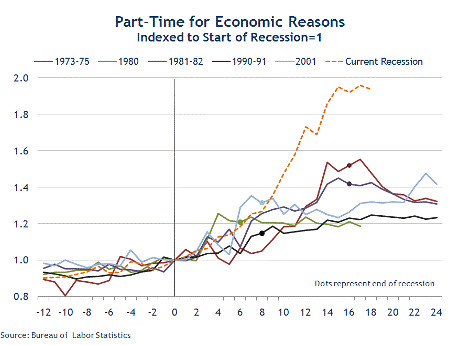Many part-timers are facing a double whammy from President Obama’s Affordable Care Act.
The law requires large employers offering health insurance to include part-time employees working 30 hours a week or more. But rather than provide healthcare to more workers, a growing number of employers are cutting back employee hours instead.
The result: Not only will these workers earn less money, but they’ll also miss out on health insurance at work.
Consider the city of Long Beach. It is limiting most of its 1,600 part-time employees to fewer than 27 hours a week, on average. City officials say that without cutting payroll hours, new health benefits would cost up to $2 million more next year, and that extra expense would trigger layoffs and cutbacks in city services.
Part-timer Tara Sievers, 43, understands why, but she still thinks it’s wrong.
“I understand there are costs to healthcare reform, but it is surely not the intent of the law for employees to lose hours,” said the outreach coordinator at the El Dorado Nature Center in Long Beach. “It’s ridiculous the city is skirting the law.”
Across the nation, hundreds of thousands of other hourly workers may also see smaller paychecks in the coming year because of this response to the federal healthcare law. The law exempts businesses with fewer than 50 full-time workers from this requirement to provide benefits.
But big restaurant chains, retailers and movie theaters are starting to trim employee hours. Even colleges are reducing courses for part-time professors to keep their hours down and avoid paying for their health premiums.
Overall, an estimated 2.3 million workers nationwide, including 240,000 in California, are at risk of losing hours as employers adjust to the new math of workplace benefits, according to research by UC Berkeley. All this comes at a time when part-timers are being hired in greater numbers as U.S. employers look to keep payrolls lean.
One consolation for part-timers is that many of them stand to benefit the most from the healthcare law’s federal premium subsidies or an expansion of Medicaid, both starting in January.
The law will require most Americans to buy health insurance or pay a penalty. Yet many lower-income people will qualify for government insurance or be eligible for discounted premiums on private policies.
“For people losing a few hours each week, that’s lost income and it has a real impact,” said Ken Jacobs, chairman of the UC Berkeley Center for Labor Research and Education. “But many low-wage, part-time workers will also have some affordable options under the federal law.”
Employers say these cutbacks are necessary given the high cost of providing benefits. The average annual premium for employee-only coverage was $6,540 in California last year. Family coverage topped $16,000 a year. Those premiums have shot up 170% in the past decade, more than five times the rate of inflation in the state.
Bill Dombrowski, chief executive of the California Retailers Assn., said employers are reducing hours because “it’s the only way to survive economically.”
The full effect of these changes in the workplace isn’t known yet because many employers are still considering what to do. Many companies waited to see whether the landmark legislation would survive a Supreme Court challenge and the outcome of last fall’s presidential election.
Now many employers are scrambling to understand the latest federal rules on implementation and are analyzing what makes the most sense for their workforce and for running their business.
There has been widespread speculation that many businesses would drop health coverage entirely in favor of paying a federal penalty of $2,000 per worker. Benefit consultants and insurance brokers say many companies examined that scenario. But they say most rejected it because of the disruption it would cause for employees and the potential for putting an employer at a competitive disadvantage in luring talented workers.
Instead, pruning the hours of part-timers has attracted far more interest.
“That will be a widespread strategy,” said Dede Kennedy-Simington, vice president at Polenzani Benefits in Pasadena. “Employers will be making sure their payroll system can flag when part-time workers are getting close to the cap they set.”
Long Beach officials said they studied the various budget options and opted for a plan that should affect only a small portion of its workforce. The city estimates about 200 part-time workers will be among the most affected by a reduction in hours, representing about 13% of its overall part-time staff. The city calculated that the federal penalty for dropping coverage completely for its 4,100 full-time employees would have been about $8 million.
“We’re in the same boat as many employers,” said Tom Modica, the city’s director of government affairs. “We need to maintain the programs and service levels we have now.”
Sievers, the outreach coordinator, has worked on and off for the city since 1994. She agreed that the city has experienced tough fiscal times as many municipalities have since the recession. But the city expects a budget surplus of $3.6 million for the coming year.
“Many part-timers are already struggling to get by in these jobs,” Sievers said.
Virginia’s Republican governor, Bob McDonnell, announced this year that all part-time state employees should work 29 hours or less to avert the 30-hour threshold. Darden Restaurants Inc., which owns the Olive Garden and Red Lobster chains, began shifting to more part-time workers last fall in a much-publicized test to keep a lid on healthcare costs. Then Darden dropped the plan after being roundly criticized.
Some California lawmakers worry that the federal penalties for not providing health coverage aren’t enough of a deterrent. They have proposed additional state fines to prevent major retailers, restaurant chains and other employers from restricting hours and dumping more of their workers onto public programs such as Medi-Cal. Opponents say the proposal is unnecessary and could deter companies from adding workers.
Some supporters of the Affordable Care Act say they welcome a gradual shift away from employer-sponsored coverage if new government-run exchanges give consumers a choice of competitively priced health plans. Some low- and middle-income workers who qualify for federal subsidies may end up paying less by buying their own policy next year compared with their contribution toward employer coverage.
“If the exchanges work,” said Nelson Lichtenstein, a professor of history at UC Santa Barbara and a labor expert, “then I’d be in favor of more people getting covered that way rather than through employers.”
—————–
Copyright 2013 – Los Angeles Times
Thanks for reading CPA Practice Advisor!
Subscribe Already registered? Log In
Need more information? Read the FAQs
Tags: Benefits, Firm Management, Payroll




